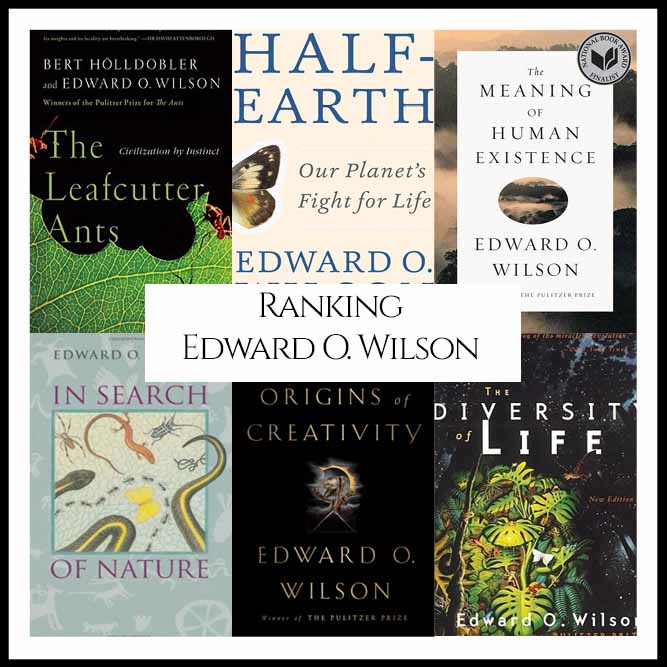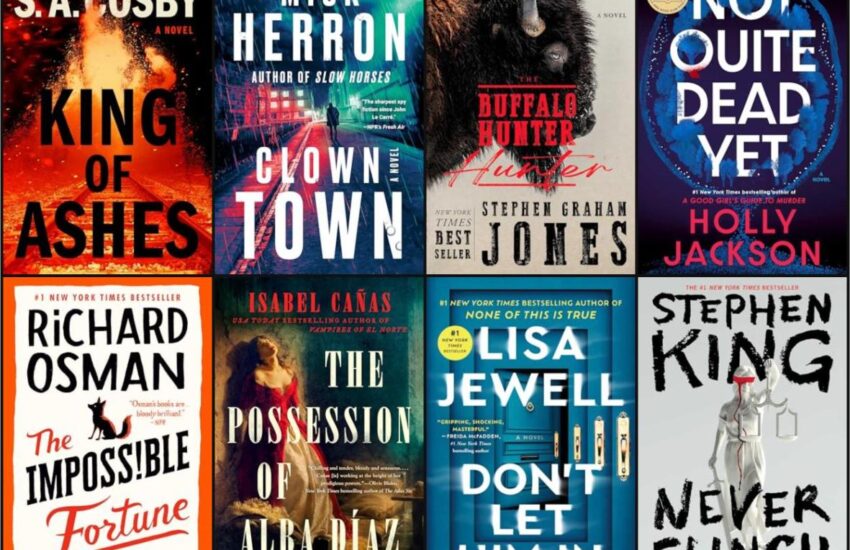Ranking Author E. O. Wilson’s Best Books (A Bibliography Countdown)
“What are E. O. Wilson’s Best Books?” We looked at all of Wilson’s authored bibliography and ranked them against one another to answer that very question!
We took all of the books written by E. O. Wilson and looked at their Goodreads, Amazon, and LibraryThing scores, ranking them against one another to see which books came out on top. The books are ranked in our list below based on which titles have the highest overall score between all 3 review sites in comparison with all of the other books by the same author. The process isn’t super scientific and in reality, most books aren’t “better” than other books as much as they are just different. That being said, we do enjoy seeing where our favorites landed, and if you aren’t familiar with the author at all, the rankings can help you see what books might be best to start with.
The full ranking chart is also included below the countdown on the bottom of the page.
Happy Scrolling!
The Top Book’s Of E. O. Wilson
29 ) Anthill: A Novel
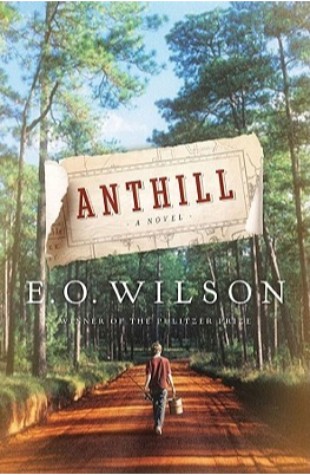 Review Website Ranks:
Review Website Ranks:
- Goodreads: 28
- Amazon: 26
- LibraryThing: 25
Inspirational and magical, this is the story of a boy who grows up determined to save the world from its most savage ecological predator: man himself. “What the hell do you want?” snarled Frogman at Raff Cody, as the boy stepped innocently on the reputed murderer’s property. Fifteen years old, Raff had only wanted to catch a glimpse of Frogman’s 1,000-pound alligator. Thus begins the epic story of Anthill, part thriller, part parable, which follows the adventures of Raff, a modern-day Huck Finn, whose improbable love of the “strange, beautiful, and elegant” world of ants ends up transforming his own life and the citizens of Nokobee County. Battling both snake bites and cynical relatives who just don’t understand his consuming fascination with the outdoors, Raff explores the pristine beauty of the Nokobee wildland. In doing so, he witnesses the remarkable creation and destruction of four separate ant colonies (“The Anthill Chronicles”)—whose histories are epics that unfold on picnic grounds—becoming a young naturalist in the process. An extraordinary undergraduate at Florida State University, Raff, despite his scientific promise, opts for Harvard Law School, believing that the environmental fight must be waged in the courtroom as well as the lab. Returning home a legal gladiator, Raff grows increasingly alarmed by the rapacious condo developers who are eager to pave and subdivide the wildlands surrounding the Chicobee River.
27 ) The Origins of Creativity
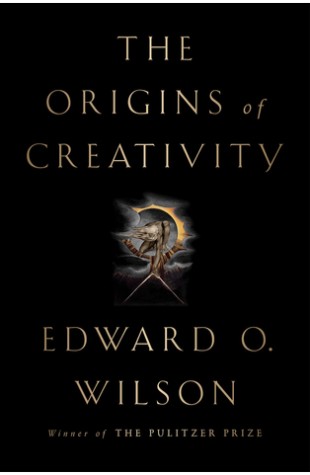 Review Website Ranks:
Review Website Ranks:
- Goodreads: 29
- Amazon: 23
- LibraryThing: 24
In this profound and lyrical book, one of our most celebrated biologists offers a sweeping examination of the relationship between the humanities and the sciences: what they offer to each other, how they can be united, and where they still fall short. Both endeavours, Edward O. Wilson reveals, have their roots in human creativity—the defining trait of our species. Reflecting on the deepest origins of language, storytelling, and art, Wilson demonstrates how creativity began not ten thousand years ago, as we have long assumed, but over one hundred thousand years ago in the Paleolithic age. Chronicling this evolution of creativity from primate ancestors to humans, The Origins of Creativity shows how the humanities, spurred on by the invention of language, have played a largely unexamined role in defining our species. And in doing so, Wilson explores what we can learn about human nature from a surprising range of creative endeavors—the instinct to create gardens, the use of metaphors and irony in speech, and the power of music and song. Our achievements in science and the humanities, Wilson notes, make us uniquely advanced as a species, but also give us the potential to be supremely dangerous, most worryingly in our abuse of the planet. The humanities in particular suffer from a kind of anthropomorphism, encumbered by a belief that we are the only species among millions that seem to matter, yet Wilson optimistically reveals how researchers will have to address this parlous situation by pushing further into the realm of science, especially fields such as evolutionary biology, neuroscience, and anthropology.
27 ) Promethean Fire: Reflections on the Origin of Mind
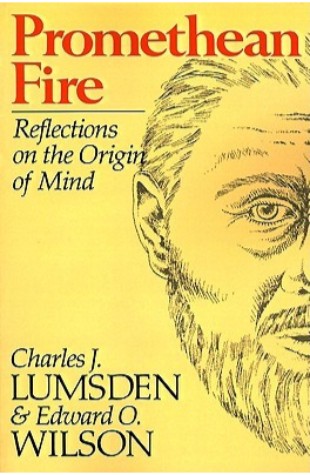 Review Website Ranks:
Review Website Ranks:
- Goodreads: 27
- Amazon: 23
- LibraryThing: 26
There is a missing link in human evolution about which few facts are known and surprisingly little has been written. It is not any one of the intermediate forms connecting modern man to his apelike ancestors. It is something much more challenging — the early human mind. How did it come into existence? And why?
25 ) The Meaning of Human Existence
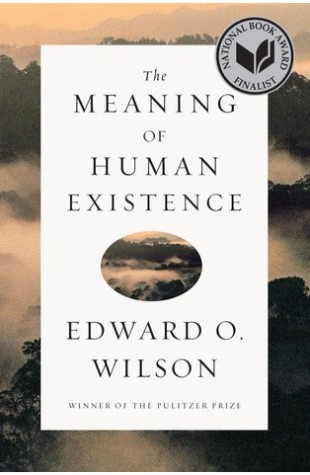 Review Website Ranks:
Review Website Ranks:
- Goodreads: 24
- Amazon: 19
- LibraryThing: 18
How did humanity originate and why does a species like ours exist on this planet? Do we have a special place, even a destiny in the universe? Where are we going, and perhaps, the most difficult question of all, “Why?” In The Meaning of Human Existence, his most philosophical work to date, Pulitzer Prize–winning biologist Edward O. Wilson grapples with these and other existential questions, examining what makes human beings supremely different from all other species. Searching for meaning in what Nietzsche once called “the rainbow colors” around the outer edges of knowledge and imagination, Wilson takes his readers on a journey, in the process bridging science and philosophy to create a twenty-first-century treatise on human existence—from our earliest inception to a provocative look at what the future of mankind portends. Continuing his groundbreaking examination of our “Anthropocene Epoch,” which he began with The Social Conquest of Earth, described by the New York Times as “a sweeping account of the human rise to domination of the biosphere,” here Wilson posits that we, as a species, now know enough about the universe and ourselves that we can begin to approach questions about our place in the cosmos and the meaning of intelligent life in a systematic, indeed, in a testable way.
25 ) Half-Earth
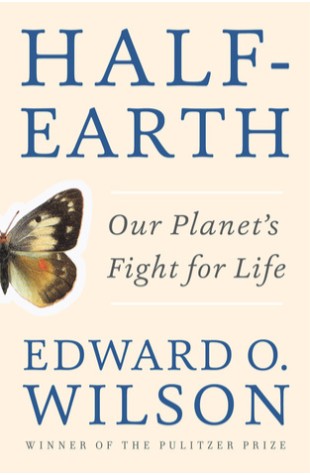 Review Website Ranks:
Review Website Ranks:
- Goodreads: 25
- Amazon: 15
- LibraryThing: 21
In order to stave off the mass extinction of species, including our own, we must move swiftly to preserve the biodiversity of our planet, says Edward O. Wilson in his most impassioned book to date. Half-Earth argues that the situation facing us is too large to be solved piecemeal and proposes a solution commensurate with the magnitude of the problem: dedicate fully half the surface of the Earth to nature. If we are to undertake such an ambitious endeavor, we first must understand just what the biosphere is, why it’s essential to our survival, and the manifold threats now facing it. In doing so, Wilson describes how our species, in only a mere blink of geological time, became the architects and rulers of this epoch and outlines the consequences of this that will affect all of life, both ours and the natural world, far into the future. Half-Earth provides an enormously moving and naturalistic portrait of just what is being lost when we clip “twigs and eventually whole braches of life’s family tree.” In elegiac prose, Wilson documents the many ongoing extinctions that are imminent, paying tribute to creatures great and small, not the least of them the two Sumatran rhinos whom he encounters in captivity. Uniquely, Half-Earth considers not only the large animals and star species of plants but also the millions of invertebrate animals and microorganisms that, despite being overlooked, form the foundations of Earth’s ecosystems.
24 ) The Creation: An Appeal to Save Life on Earth
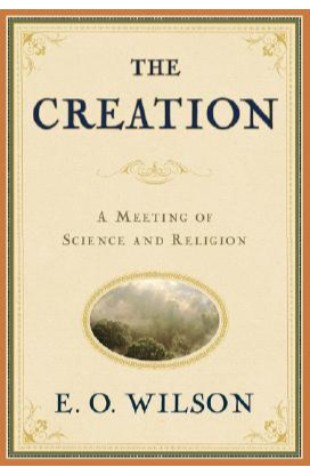 Review Website Ranks:
Review Website Ranks:
- Goodreads: 23
- Amazon: 15
- LibraryThing: 22
Dear Pastor: We have not met, yet I feel I know you well enough to call you friend. First of all, we grew up in the same faith. Although I no longer belong to that faith, I am confident that if we met and spoke privately of our deepest beliefs, it would be in a spirit of mutual respect and goodwill. I write to you now for your counsel and help. Let us see if we can, and you are willing, to meet on the near side of metaphysics in order to deal with the real world we share. I suggest that we set aside our differences in order to save the Creation. The defense of living Nature is a universal value. It doesn’t rise from nor does it promote any religious or ideological dogma. Rather, it serves without discrimination the interests of all humanity. Pastor, we need your help. The Creation—living Nature—is in deep trouble. The Creation is E. O. Wilson’s most important work since the publications of Sociobiology and Biophilia. Like Rachel Carson’s Silent Spring, it is a book about the fate of the earth and the survival of our planet. Yet while Carson was specifically concerned with insecticides and the ecological destruction of our natural resources, Wilson, the two-time Pulitzer Prize-winner, attempts his new social revolution by bridging the seemingly irreconcilable worlds of fundamentalism and science.
22 ) Consilience: The Unity of Knowledge
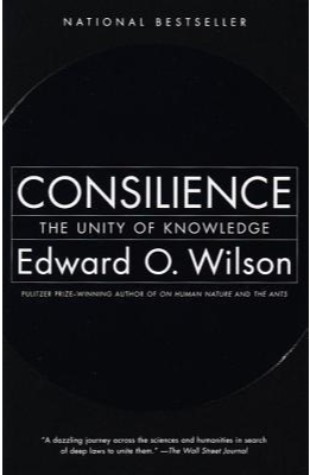 Review Website Ranks:
Review Website Ranks:
- Goodreads: 19
- Amazon: 19
- LibraryThing: 20
“A dazzling journey across the sciences and humanities in search of deep laws to unite them.” –The Wall Street Journal One of our greatest living scientists–and the winner of two Pulitzer Prizes for On Human Nature and The Ants–gives us a work of visionary importance that may be the crowning achievement of his career. In Consilience (a word that originally meant “jumping together”), Edward O. Wilson renews the Enlightenment’s search for a unified theory of knowledge in disciplines that range from physics to biology, the social sciences and the humanities. Using the natural sciences as his model, Wilson forges dramatic links between fields. He explores the chemistry of the mind and the genetic bases of culture. He postulates the biological principles underlying works of art from cave-drawings to Lolita.
22 ) Pheidole in the New World: A Dominant, Hyperdiverse Ant Genus
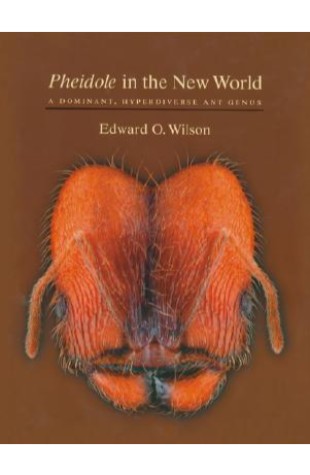 Review Website Ranks:
Review Website Ranks:
- Goodreads: 4
- Amazon: 28
- LibraryThing: 26
View a collection of videos on Professor Wilson entitled “On the Relation of Science and the Humanities”Species of the genus Pheidole are the most abundant and diverse ants of the New World and range from the northern United States to Argentina. In this richly illustrated book, Edward O. Wilson untangles its classification for the first time, characterizing all 625 known species, 341 of which are new to science, and ordering them into 19 species groups. The author’s keys and drawings, the latter showing complete body views arranged in the style of field books, allow rapid identification by anyone with an elementary understanding of entomology. In presenting all of Pheidole, the book covers one-fifth of the known ant species of the Western Hemisphere, including many of the commonest forms.Wilson also summarizes our knowledge of the natural history of each species, much of it previously unpublished. In addition, he provides a general account of hyperdiversity, confirming that it is not a statistical artifact but a genuine biological phenomenon that can best be understood by detailed analyses of groups of organisms such as the Pheidole ants.
21 ) A Window on Eternity: A Biologist’s Walk Through Gorongosa National Park
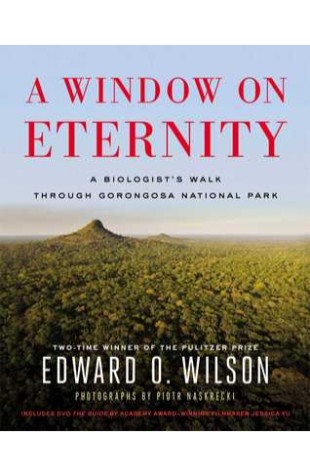 Review Website Ranks:
Review Website Ranks:
- Goodreads: 18
- Amazon: 6
- LibraryThing: 23
The remarkable story of how one of the most biologically diverse habitats in the world was destroyed, restored, and continues to evolve—with stunning, full-color photographs by two of the world’s best wildlife photographers. A Window on Eternity is a stunning book of splendid prose and gorgeous photography about one of the biologically richest places in Africa and perhaps in the world. Gorongosa National Park in Mozambique was nearly destroyed in a brutal civil war, then was reborn and is now evolv-ing back to its original state. Edward O. Wilson’s personal, luminous description of the wonders of Gorongosa is beautifully complemented by Piotr Naskrecki’s extraordinary photographs of the park’s exquisite natural beauty. A bonus DVD of Academy Award–winning director Jessica Yu’s documentary, The Guide, is also included with the book.
18 ) Kingdom of Ants: Jose Celestino Mutis and the Dawn of Natural History in the New World
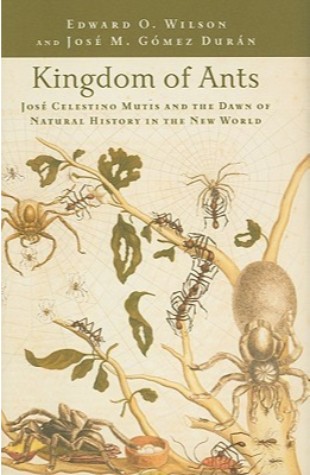 Review Website Ranks:
Review Website Ranks:
- Goodreads: 26
- Amazon: 6
- LibraryThing: 13
In 1760, the 28-year-old Mutis—newly appointed as the personal physician of the Viceroy of the New Kingdom of Granada—embarked on a 48-year exploration of the natural world of northern South America. His thirst for knowledge led Mutis to study the region’s flora, become a professor of mathematics, construct the first astronomical observatory in the Western Hemisphere, and amass one of the largest scientific libraries in the world. He translated Newton’s writings and penned essays about Copernicus; lectured extensively on astronomy, geography, and meteorology; and eventually became a priest. But, as two-time Pulitzer Prize–winner Edward O. Wilson and Spanish natural history scholar José M. Gómez Durán reveal in this enjoyable and illustrative account, one of Mutis’s most magnificent accomplishments involved ants.
18 ) The Biophilia Hypothesis
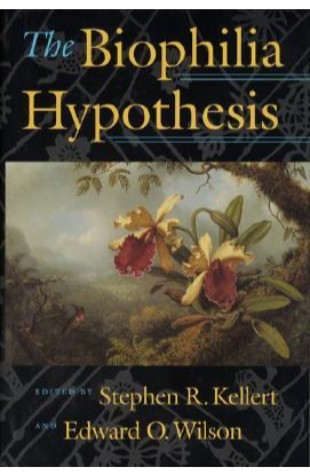 Review Website Ranks:
Review Website Ranks:
- Goodreads: 9
- Amazon: 23
- LibraryThing: 13
Biophilia” is the term coined by Edward O. Wilson, author of The Diversity of Life and winner of two Pulitzer prizes, to describe what he believes is our innate affinity for the natural world. In his landmark book Biophilia, he examined how our tendency to focus on life and lifelike processes might be a biologically based need, integral to our development as individuals and as a species. The idea has caught the imagination of diverse thinkers. The Biophilia Hypothesis brings together the views of some of the most creative scientists of our time, each attempting to amplify and refine the concept of biophilia. The various perspectives – psychological, biological, cultural, symbolic, and aesthetic – frame the theoretical issues by presenting empirical evidence that supports or refutes the hypothesis. Numerous examples illustrate the idea that biophilia and its converse, biophobia, have a genetic component: people develop fear and even full-blown phobias of snakes and spiders with very little negative reinforcement, while more threatening modern artifacts – knives, guns, automobiles – rarely elicit such a response; people would rather look at water, green vegetation, or flowers than built structures of glass and concrete; and the development of language, myth, and thought appears to be greatly dependent on the use of natural symbols, particularly animals.
18 ) The Social Conquest of Earth
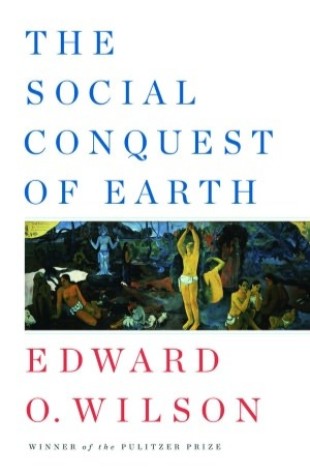 Review Website Ranks:
Review Website Ranks:
- Goodreads: 20
- Amazon: 6
- LibraryThing: 19
Where did we come from? What are we? Where are we going? In a generational work of clarity and passion, one of our greatest living scientists directly addresses these three fundamental questions of religion, philosophy, and science while “overturning the famous theory that evolution naturally encourages creatures to put family first” (Discover magazine). Refashioning the story of human evolution in a work that is certain to generate headlines, Wilson draws on his remarkable knowledge of biology and social behavior to show that group selection, not kin selection, is the primary driving force of human evolution. He proves that history makes no sense without prehistory, and prehistory makes no sense without biology. Demonstrating that the sources of morality, religion, and the creative arts are fundamentally biological in nature, Wilson presents us with the clearest explanation ever produced as to the origin of the human condition and why it resulted in our domination of the Earth’s biosphere.
16 ) Biophilia
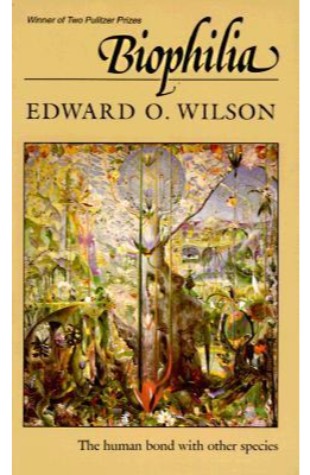 Review Website Ranks:
Review Website Ranks:
- Goodreads: 14
- Amazon: 23
- LibraryThing: 7
The eminent biologist reflects on his own response to nature and the aesthetic aspects of his exploration of natural systems in an intensely personal essay that examines the essential links between mankind and the rest of the living world.
16 ) The Future of Life
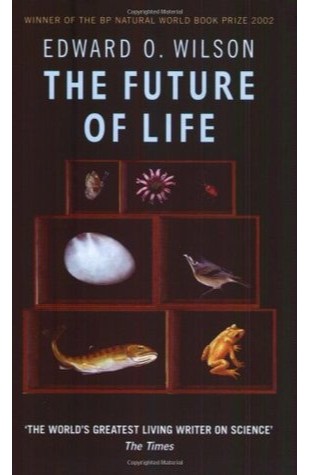 Review Website Ranks:
Review Website Ranks:
- Goodreads: 17
- Amazon: 15
- LibraryThing: 12
A magisterial accomplishment: both a moving description of our biosphere and a guidebook for the protection of all its species, including humankind. From one of the world’s most influential scientists (and two-time Pulitzer Prize–winning author) comes his most timely and important book yet: an impassioned call for quick and decisive action to save Earth’s biological heritage, and a plan to achieve that rescue. Today we understand that our world is infinitely richer than was ever previously guessed. Yet it is so ravaged by human activity that half its species could be gone by the end of the present century. These two contrasting truths—unexpected magnificence and underestimated peril—have become compellingly clear during the past two decades of research on biological diversity. In this dazzlingly intelligent and ultimately hopeful book, Wilson describes what treasures of the natural world we are about to lose forever—in many cases animals, insects, and plants we have only just discovered, and whose potential to nourish us, protect us, and cure our illnesses is immeasurable—and what we can do to save them. In the process, he explores the ethical and religious bases of the conservation movement and deflates the myth that environmental policy is antithetical to economic growth by illustrating how new methods of conservation can ensure long-term economic well-being.
15 ) From So Simple a Beginning: Darwin’s Four Great Books. 2005
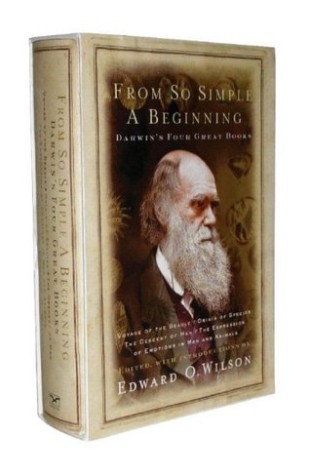 Review Website Ranks:
Review Website Ranks:
- Goodreads: 5
- Amazon: 12
- LibraryThing: 26
Never before have the four great works of Charles Darwin–Voyage of the H.M.S. Beagle (1845), The Origin of Species (1859), The Descent of Man (1871), and The Expression of Emotions in Man and Animals (1872)–been collected under one cover. Undertaking this challenging endeavor 123 years after Darwin’s death, two-time Pulitzer Prize winner Edward O. Wilson has written an introductory essay for the occasion, while providing new, insightful introductions to each of the four volumes and an afterword that examines the fate of evolutionary theory in an era of religious resistance. In addition, Wilson has crafted a creative new index to accompany these four texts, which links the nineteenth-century, Darwinian evolutionary concepts to contemporary biological thought.
14 ) On Human Nature
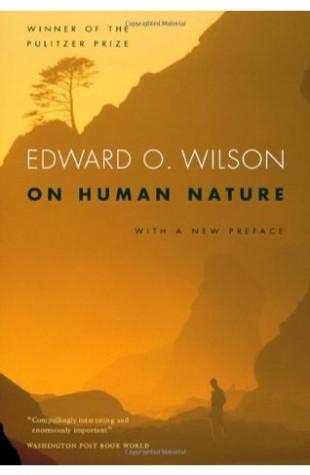 Review Website Ranks:
Review Website Ranks:
- Goodreads: 15
- Amazon: 15
- LibraryThing: 11
No one who cares about the human future can afford to ignore E.O. Wilson’s book. On Human Nature begins a new phase in the most important intellectual controversy of this generation: Is human behavior controlled by the species’ biological heritage? Does this heritage limit human destiny? With characteristic pugency and simplicity of style, the author of Sociobiology challenges old prejudices and current misconceptions about the nature-nurture debate. In his new preface E. O. Wilson reflects on how he came to write this book: how The Insect Societies led him to write Sociobiology, and how the political and religious uproar that engulfed that book persuaded him to write another book that would better explain the relevance of biology to the understanding of human behavior.
11 ) The Superorganism: The Beauty,Elegance
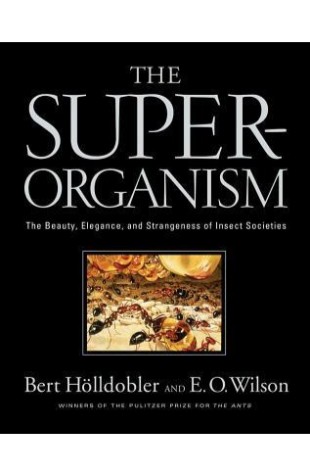 Review Website Ranks:
Review Website Ranks:
- Goodreads: 12
- Amazon: 19
- LibraryThing: 9
The Superorganism promises to be one of the most important scientific works published in this decade. Coming eighteen years after the publication of The Ants, this new volume expands our knowledge of the social insects (among them, ants, bees, wasps, and termites) and is based on remarkable research conducted mostly within the last two decades. These superorganisms—a tightly knit colony of individuals, formed by altruistic cooperation, complex communication, and division of labor—represent one of the basic stages of biological organization, midway between the organism and the entire species. The study of the superorganism, as the authors demonstrate, has led to important advances in our understanding of how the transitions between such levels have occurred in evolution and how life as a whole has progressed from simple to complex forms.
11 ) Letters to a Young Scientist
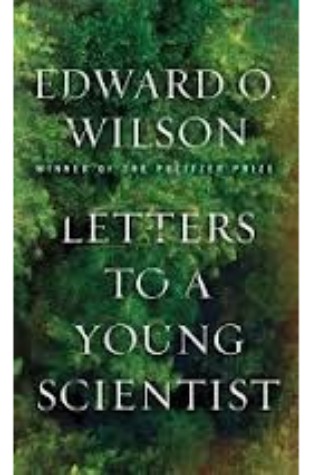 Review Website Ranks:
Review Website Ranks:
- Goodreads: 21
- Amazon: 6
- LibraryThing: 13
Inspired by Rainer Maria Rilke’s Letters to a Young Poet, Edward O. Wilson has distilled sixty years of teaching into a book for students, young and old. Reflecting on his coming-of-age in the South as a Boy Scout and a lover of ants and butterflies, Wilson threads these twenty-one letters, each richly illustrated, with autobiographical anecdotes that illuminate his career–both his successes and his failures–and his motivations for becoming a biologist. At a time in human history when our survival is more than ever linked to our understanding of science, Wilson insists that success in the sciences does not depend on mathematical skill, but rather a passion for finding a problem and solving it. From the collapse of stars to the exploration of rain forests and the oceans’ depths, Wilson instills a love of the innate creativity of science and a respect for the human being’s modest place in the planet’s ecosystem in his readers.
11 ) The Diversity of Life
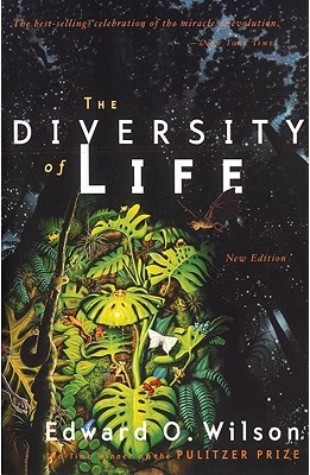 Review Website Ranks:
Review Website Ranks:
- Goodreads: 11
- Amazon: 12
- LibraryThing: 17
In this book a master scientist tells the story of how life on earth evolved. Edward O. Wilson eloquently describes how the species of the world became diverse and why that diversity is threatened today as never before. A great spasm of extinction — the disappearance of whole species — is occurring now, caused this time entirely by humans. Unlike the deterioration of the physical environment, which can be halted, the loss of biodiversity is a far more complex problem — and it is irreversible. Defining a new environmental ethic, Wilson explains why we must rescue whole ecosystems, not only individual species.
10 ) Systematic Zoology
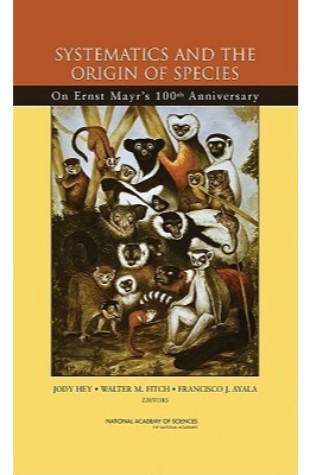 Review Website Ranks:
Review Website Ranks:
- Goodreads: 10
- Amazon: 1
- LibraryThing: 26
In December 2004, the National Academy of Sciences sponsored a colloquium on a oeSystematics and the Origin of Speciesa to celebrate Ernst Mayra (TM)s 100th anniversary and to explore current knowledge concerning the origin of species. In 1942, Ernst Mayr, one of the twentieth centurya (TM)s greatest scientists, published Systematics and the Origin of Species, a seminal book of the modern theory of evolution, where he advanced the significance of population variation in the understanding of evolutionary process and the origin of new species. Mayr formulated the transition from Linnaeusa (TM)s static species concept to the dynamic species concept of the modern theory of evolution and emphasized the species as a community of populations, the role of reproductive isolation, and the ecological interactions between species. In addition to a preceding essay by Edward O. Wilson, this book includes the 16 papers presented by distinguished evolutionists at the colloquium.
9 ) Nature Revealed: Selected Writings 1949–2006
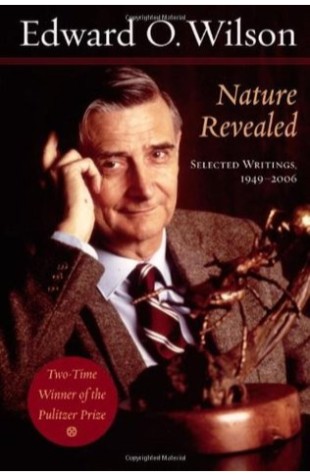 Review Website Ranks:
Review Website Ranks:
- Goodreads: 7
- Amazon: 28
- LibraryThing: 1
Two-time Pulitzer Prize winner Edward O. Wilson is one of the leading biologists and philosophical thinkers of our time. In this compelling collection, Wilson’s observations range from the tiny glands of ants to the nature of the living universe. Many of the pieces are considered landmarks in evolutionary biology, ecology, and behavioral biology. Wilson explores topics as diverse as slavery in ants, the genetic basis of societal structure, the discovery of the taxon cycle, the original formulation of the theory of island biogeography, a critique of subspecies as a unit of classification, and the conservation of life’s diversity. Each article is presented in its original form, dating from Wilson’s first published article in 1949 to his most recent exploration of the natural world. Preceding each piece is a brief essay by Wilson that explains the context in which the article was written and provides insights into the scientist himself and the debates of the time. This collection enables us to share Wilson’s various vantage points and to view the complexities of nature through his eyes.
8 ) In Search of Nature
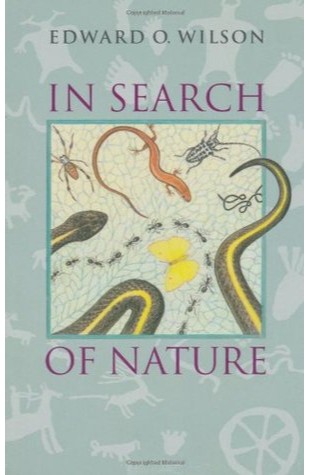 Review Website Ranks:
Review Website Ranks:
- Goodreads: 22
- Amazon: 2
- LibraryThing: 10
Perhaps more than any other scientist of our century, Edward O. Wilson has scrutinized animals in their natural settings, tweezing out the dynamics of their social organization, their relationship with their environments, and their behavior, not only for what it tells us about the animals themselves, but for what it can tell us about human nature and our own behavior. He has brought the fascinating and sometimes surprising results of these studies to general readers through a remarkable collection of books, including The Diversity of Life, The Ants, On Human Nature, and Sociobiology. The grace and precision with which he writes of seemingly complex topics has earned him two Pulitzer prizes, and the admiration of scientists and general readers around the world.In Search of Nature presents for the first time a collection of the seminal short writings of Edward O. Wilson, addressing in brief and eminently readable form the themes that have actively engaged this remarkable intellect throughout his career.The central theme of the essays is that wild nature and human nature are closely interwoven. I argue that the only way to make complete sense of either is by examining both closely and together as products of evolution…. Human behavior is seen not just as the product of recorded history, ten thousand years recent, but of deep history, the combined genetic and cultural changes that created humanity over hundreds of thousands of years.
7 ) The Leafcutter Ants: Civilization by Instinct
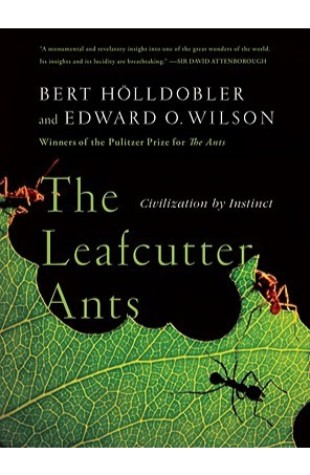 Review Website Ranks:
Review Website Ranks:
- Goodreads: 13
- Amazon: 6
- LibraryThing: 13
The Leafcutter Ants is the most detailed and authoritative description of any ant species ever produced. With a text suitable for both a lay and a scientific audience, the book provides an unforgettable tour of Earth’s most evolved animal societies. Each colony of leafcutters contains as many as five million workers, all the daughters of a single queen that can live over a decade. A gigantic nest can stretch thirty feet across, rise five feet or more above the ground, and consist of hundreds of chambers that reach twenty-five feet below the ground surface. Indeed, the leafcutters have parlayed their instinctive civilization into a virtual domination of forest, grassland, and cropland—from Louisiana to Patagonia. Inspired by a section of the authors’ acclaimed The Superorganism, this brilliantly illustrated work provides the ultimate explanation of what a social order with a half-billion years of animal evolution has achieved.
6 ) The Theory of Island Biogeography
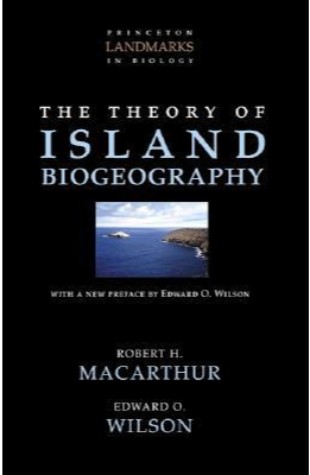 Review Website Ranks:
Review Website Ranks:
- Goodreads: 6
- Amazon: 19
- LibraryThing: 2
Biogeography has long remained in a natural history phase, but the authors of this book believe it is in a position to enter an experimental and theoretical phase–that it can now be discussed in terms of the first principles of population ecology and genetics. Using mathematical and graphical models, they provide a first theoretical framework for faunal patterns on islands. Particular attention is paid to problems of island colonization, to the balance between immigration and extinction, and to the evolution of colonists following successful establishment. Wherever possible empirical evidence is assembled and compared with the theoretical predictions. Originally published in 1967. The Princeton Legacy Library uses the latest print-on-demand technology to again make available previously out-of-print books from the distinguished backlist of Princeton University Press. These editions preserve the original texts of these important books while presenting them in durable paperback and hardcover editions. The goal of the Princeton Legacy Library is to vastly increase access to the rich scholarly heritage found in the thousands of books published by Princeton University Press since its founding in 1905. Originally published in 1967.
5 ) Sociobiology: The New Synthesis 1975
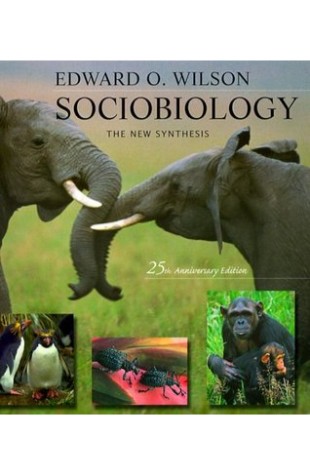 Review Website Ranks:
Review Website Ranks:
- Goodreads: 15
- Amazon: 2
- LibraryThing: 6
View a collection of videos on Professor Wilson entitled “On the Relation of Science and the Humanities” Harvard University Press is proud to announce the re-release of the complete original version of Sociobiology: The New Synthesis–now available in paperback for the first time. When this classic work was first published in 1975, it created a new discipline and started a tumultuous round in the age-old nature versus nurture debate. Although voted by officers and fellows of the international Animal Behavior Society the most important book on animal behavior of all time, Sociobiology is probably more widely known as the object of bitter attacks by social scientists and other scholars who opposed its claim that human social behavior, indeed human nature, has a biological foundation. The controversy surrounding the publication of the book reverberates to the present day. In the introduction to this Twenty-Fifth Anniversary Edition, Edward O. Wilson shows how research in human genetics and neuroscience has strengthened the case for a biological understanding of human nature. Human sociobiology, now often called evolutionary psychology, has in the last quarter of a century emerged as its own field of study, drawing on theory and data from both biology and the social sciences.
4 ) Journey to the Ants: A Story of Scientific Exploration
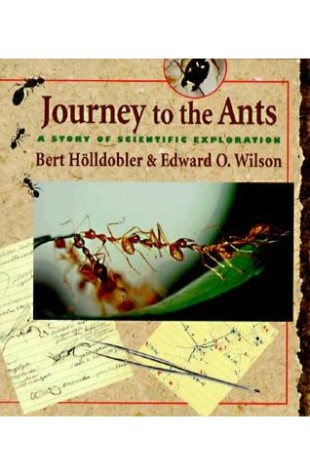 Review Website Ranks:
Review Website Ranks:
- Goodreads: 3
- Amazon: 12
- LibraryThing: 5
Hailed as “a masterpiece” by Scientific American and as “the greatest of all entomology books” by Science, Bert Holldobler and Edward O. Wilson’s monumental treatise The Ants also was praised in the popular press and won a Pulitzer Prize. This overwhelming success attests to a fact long known and deeply felt by the authors: the infinite fascination of their tiny subjects. This fascination finds its full expression in Journey to the Ants, an overview of myrmecology that is also an eloquent tale of the authors’ pursuit of these astonishing insects. Richly illustrated and delightfully written, Journey to the Ants combines autobiography and scientific lore to convey the excitement and pleasure the study of ants can offer. The authors interweave their personal adventures with the social lives of ants, building, from the first minute observations of childhood, a remarkable account of these abundant insects’ evolutionary achievement. Accompanying Holldobler and Wilson, we peer into the colony to see how ants cooperate and make war, how they reproduce and bury their dead, how they use propaganda and surveillance, and how they exhibit a startlingly familiar ambivalence between allegiance and self-aggrandizement.
3 ) Naturalist
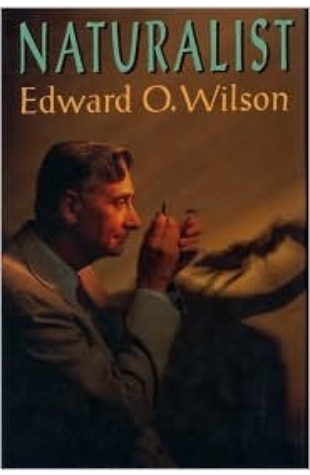 Review Website Ranks:
Review Website Ranks:
- Goodreads: 8
- Amazon: 4
- LibraryThing: 7
In Naturalist, Wilson describes for the first time both his growth as a scientist and the evolution of the science he has helped define. He traces the trajectory of his life – from a childhood spent exploring the Gulf Coast of Alabama and Florida to life as a tenured professor at Harvard – detailing how his youthful fascination with nature blossomed into a lifelong calling. He recounts with drama and wit the adventures of his days as a student at the University of Alabama and his four decades at Harvard University, where he has achieved renown as both teacher and researcher. As the narrative of Wilson’s life unfolds, the reader is treated to an inside look at the origin and development of ideas that guide today’s biological research. Theories that are now widely accepted in the scientific world were once untested hypotheses emerging from one man’s broad-gauged studies. Throughout Naturalist, we see Wilson’s mind and energies constantly striving to help establish many of the central principles of the field of evolutionary biology. The story of Edward O. Wilson’s life provides fascinating insights into the making of a scientist and a valuable look at some of the most thought-provoking ideas of our time.
2 ) The Ants
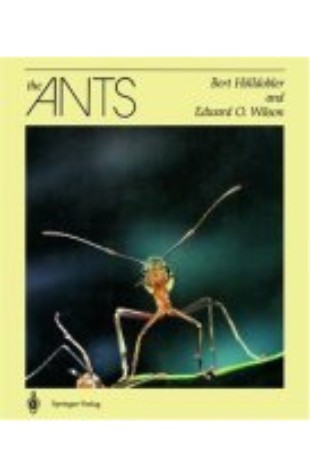 Review Website Ranks:
Review Website Ranks:
- Goodreads: 2
- Amazon: 6
- LibraryThing: 3
This landmark work, the distillation of a lifetime of research by the world’s leading myrmecologists, is a thoroughgoing survey of one of the largest and most diverse groups of animals on the planet. Hölldobler and Wilson review in exhaustive detail virtually all topics in the anatomy, physiology, social organization, ecology, and natural history of the ants. In large format, with almost a thousand line drawings, photographs, and paintings, it is one of the most visually rich and all-encompassing views of any group of organisms on earth. It will be welcomed both as an introduction to the subject and as an encyclopedia reference for researchers in entomology, ecology, and sociobiology.
1 ) The Insect Societies
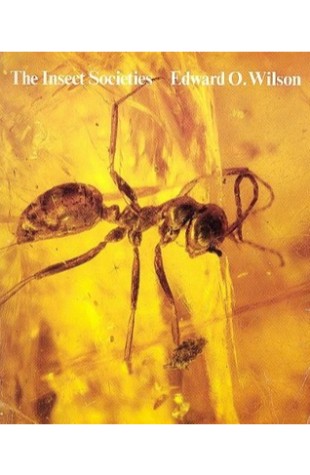 Review Website Ranks:
Review Website Ranks:
- Goodreads: 1
- Amazon: 4
- LibraryThing: 3
Conducts a definitive study of the social structure and symbiotic relationships of termites, social wasps, bees, and ants.
